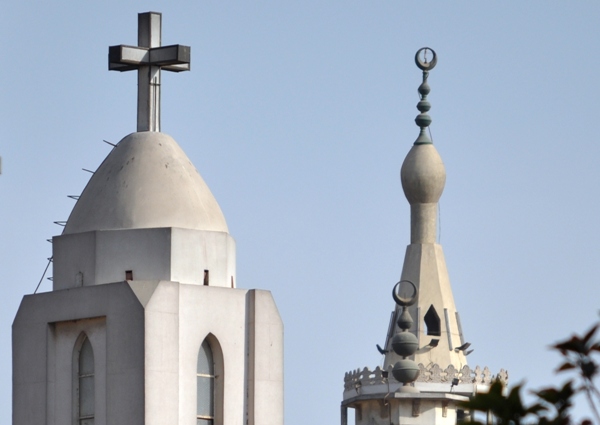
“Freedom of belief is inviolable and the state guarantees freedom of religious practice and freedom to establish houses of worship for the divine religions (Islam – Christianity – Judaism)…” So says Egypt’s new constitution, specifically in Article 43. This same phrase was included in Egypt’s 1971 constitution, and it seems that little else has changed with the passing of the post-revolutionary constitution.
Alber Saber, an Egyptian atheist handed a three-year sentence on charges of ‘blasphemy’, is a clear example of the absence of freedom of belief in Egypt. Saber was attacked and physically assaulted at his home, before he was arrested, tried, and sentenced for publicly declaring himself an atheist, and for broadcasting videos online that are critical of religion. Saber appealed the sentence and then fled Egypt. One might agree or disagree with Saber’s beliefs and conduct, however, his sentencing is indicative of the absence of a real freedom of belief in Egypt. The attack on Saber is also enshrined in Egypt’s constitution, since Article 44, forbidding the “insult or abuse of prophets and religious messengers,” essentially boils down to a blasphemy clause.
Violations of personal beliefs aside, the freedom to build houses of worship is also sorely lacking in Egypt. Non-Abrahamic religions are unable to construct houses of worship, while strict restrictions are imposed on attempts to construct or renovate churches in Egypt. “These barriers include asking for permissions from the National Security Authority, the General Intelligence body, in addition to many other barriers,” Ramy Ghanem, a human rights lawyer explains. All efforts to pass a unified house of worship law have been futile.
For the dwindling Jewish community in Egypt, less than 20 synagogues remain in Egypt, none of which are actually functioning temples. Additionally, for the few thousand Baha’i in Egypt, there are no public houses of worship. Considered by some an Abrahamic religion, Egypt’s officials believe otherwise, resulting in difficulties in enrolling in public schools and obtaining marriage certificates. Since Gamal Abdel Nasser’s move to shut down the only Baha’i house of worship in Egypt, the religion is no longer recognized by the state and establishing any houses of worship is, unsurprisingly, prohibited. This leaves this freedom exclusive to Islamic houses of worship, contrary to the provisions stated in the constitution.
With this lack of freedom to establish houses of worship comes a lack of freedom of religious practice. For the Egyptian Jewish community, there are no remaining functioning houses of worship where they can practice their religion, and since Baha’ism is not recognized by the state as an Abrahimic religion, they accordingly have no right to practice their religion.
Freedom of religious practice should at least be extended to followers of Islam and Christianity. While for Sunni Muslims this may be the case, Egypt’s Shi’a minority complains of being unable to practice their doctrine in religious sites such as Hussein mosque.
For Egypt’s Christians the issue is more complicated. Adding to restrictions imposed on attempts to construct new churches in Egypt, existing churches are subject to frequent attacks often driven by rumors. Rumors of an inter-religious affair in a village in Helwan, led to the torching of the church, while in Marinab, a church under construction was burned following rumors that the necessary permits to build it were not secured. Reports indicate that these incidents have led to a rising tendency among Copts to emigrate.
Accordingly, Egypt’s placement among the 15 worst violators of religious freedom by the United States Commission on International Religious Freedom (UNSCIRF) does not come as a surprise. Egypt is joined on the list by Burma, accused of brutal sectarian violence against it Muslim population. Indeed, oppressing Muslims in Burma is not justifiable, but it is clear that Egyptian Copts face similar conditions. The Muslim Brotherhood’s Freedom and Justice Party continues to issue statements condemning Burma’s sectarian violence against Muslims, but has remained largely silent on attacks on Copts are. Rhetoric on sectarian violence in Egypt is refused by the Brotherhood and its political arm the Freedom and Justice Party. The Brotherhood lens instead portrays it as fabricated provocations or as issues blown out of proportion by the media.
In order for Egypt to be removed from UNSCIRF’s list, three changes must take place:
1. Constitutional amendments are needed, whereby Article 43 is altered and Article 44 is removed.
2. The application of laws managing freedom of belief and worship, and the implementation of deterrent punishments for those attempting to breach those freedoms, are necessary. Like many unresolved issues in Egypt, accountability is essential.
3. Most challenging, but also likely most important is that with the constitution and law leading the way, social awareness is key in order for these changes to have any real effect.
This leads us to the crucial question: Will we ever see these actions take place in today’s Egypt? The current regime has given no indication that this will happen.
Fady Salah is an Egyptian writer, journalist, political analyst, and author.
Image: Mosque%20Church%20Rachid%20H.jpg
